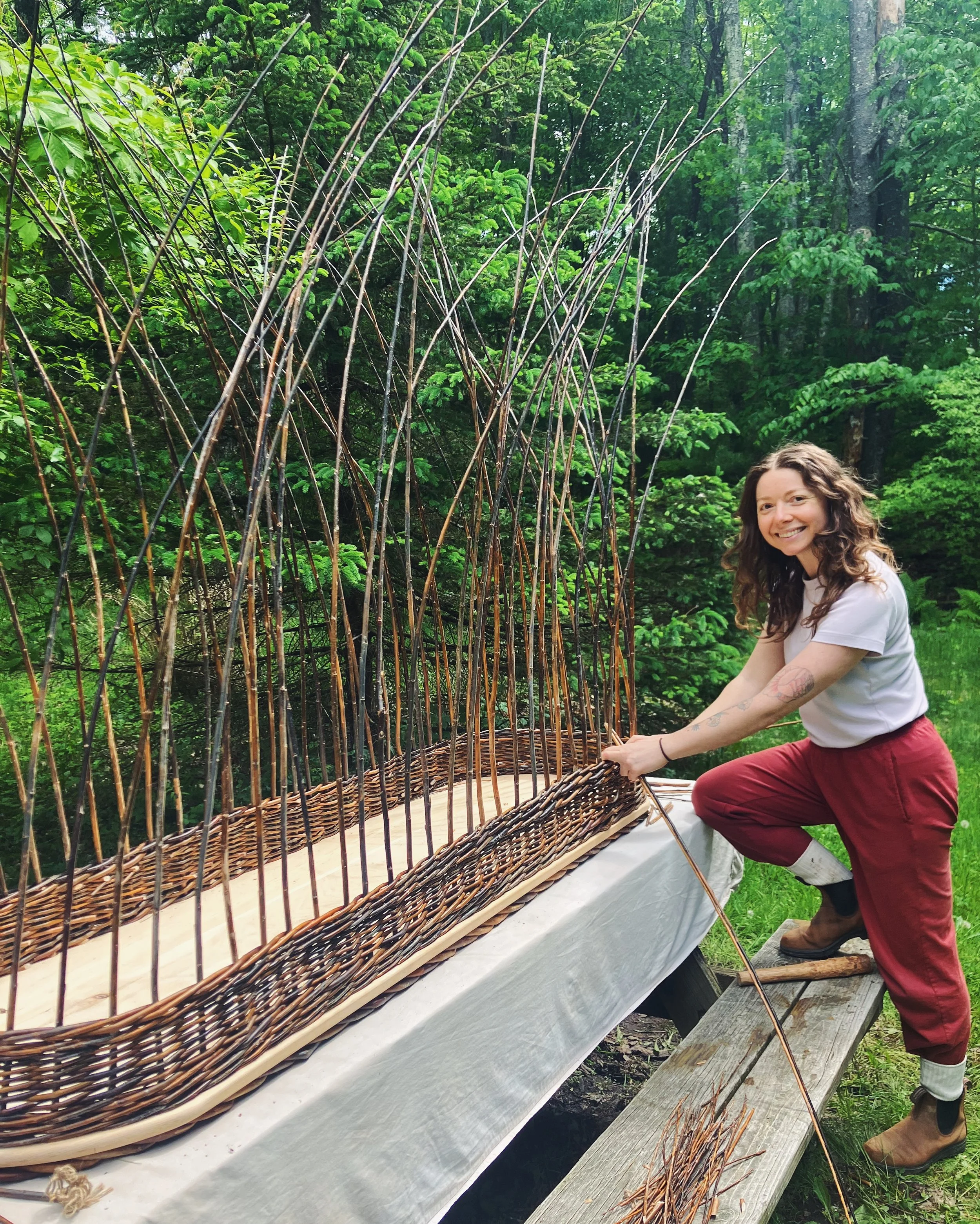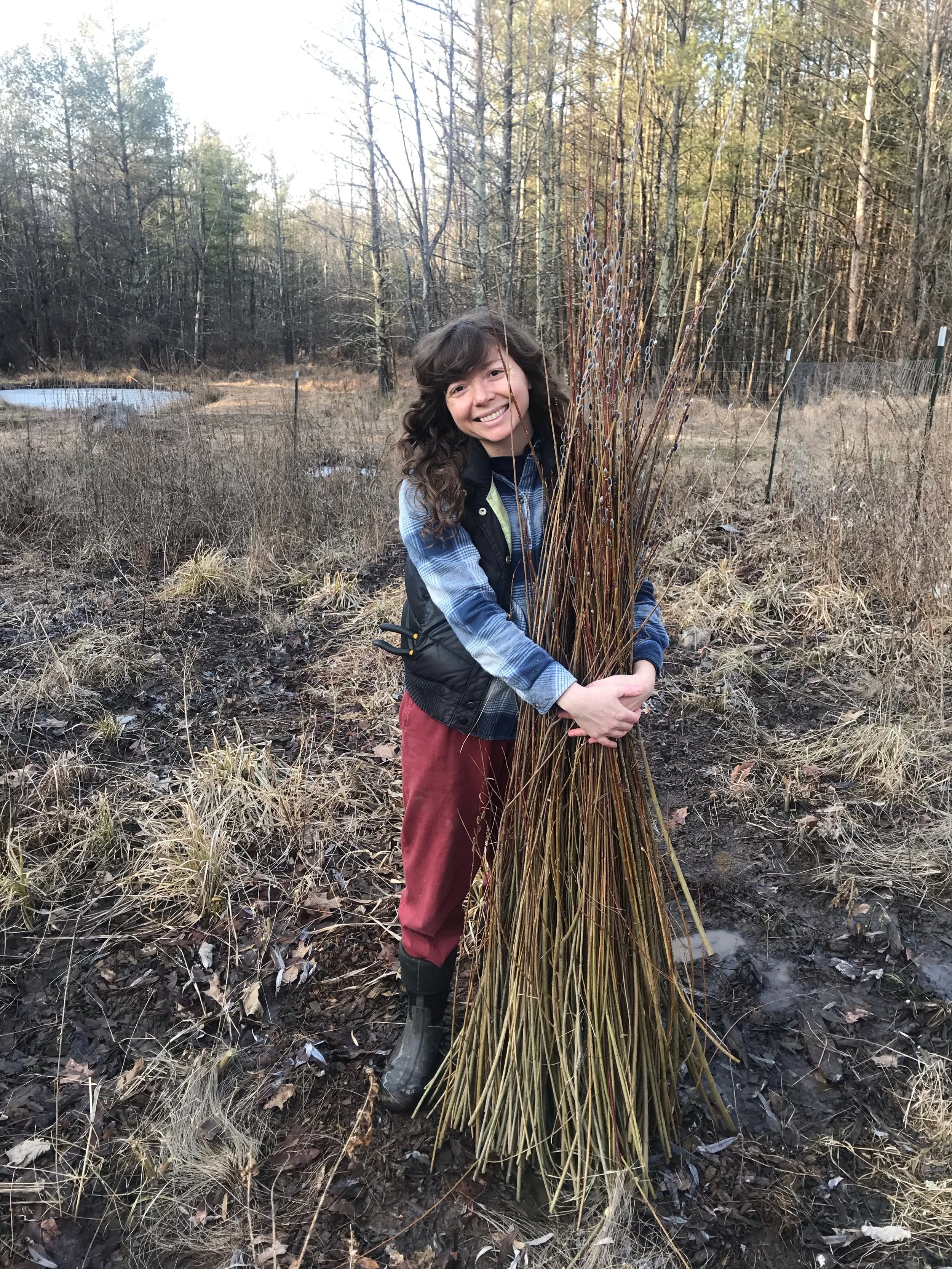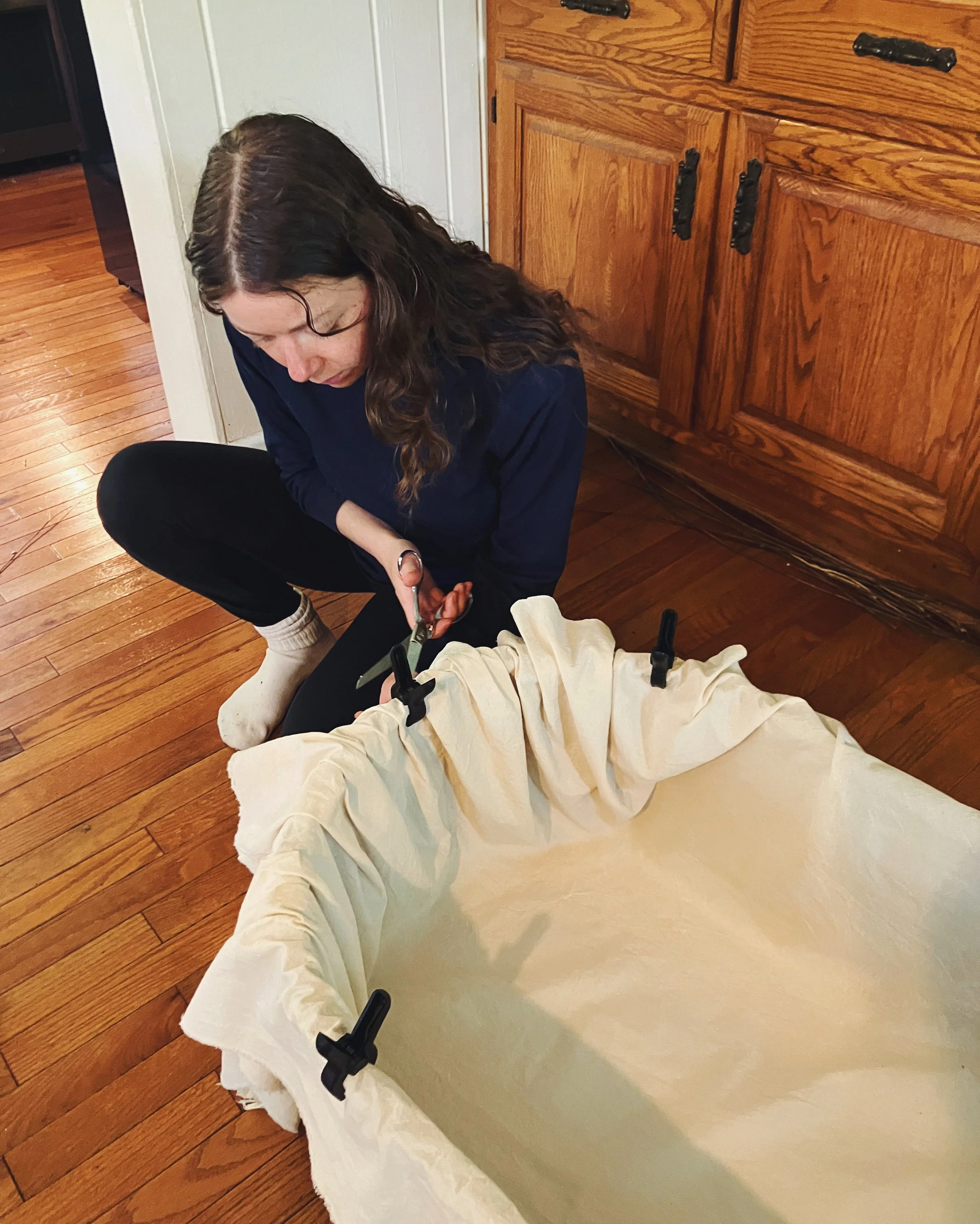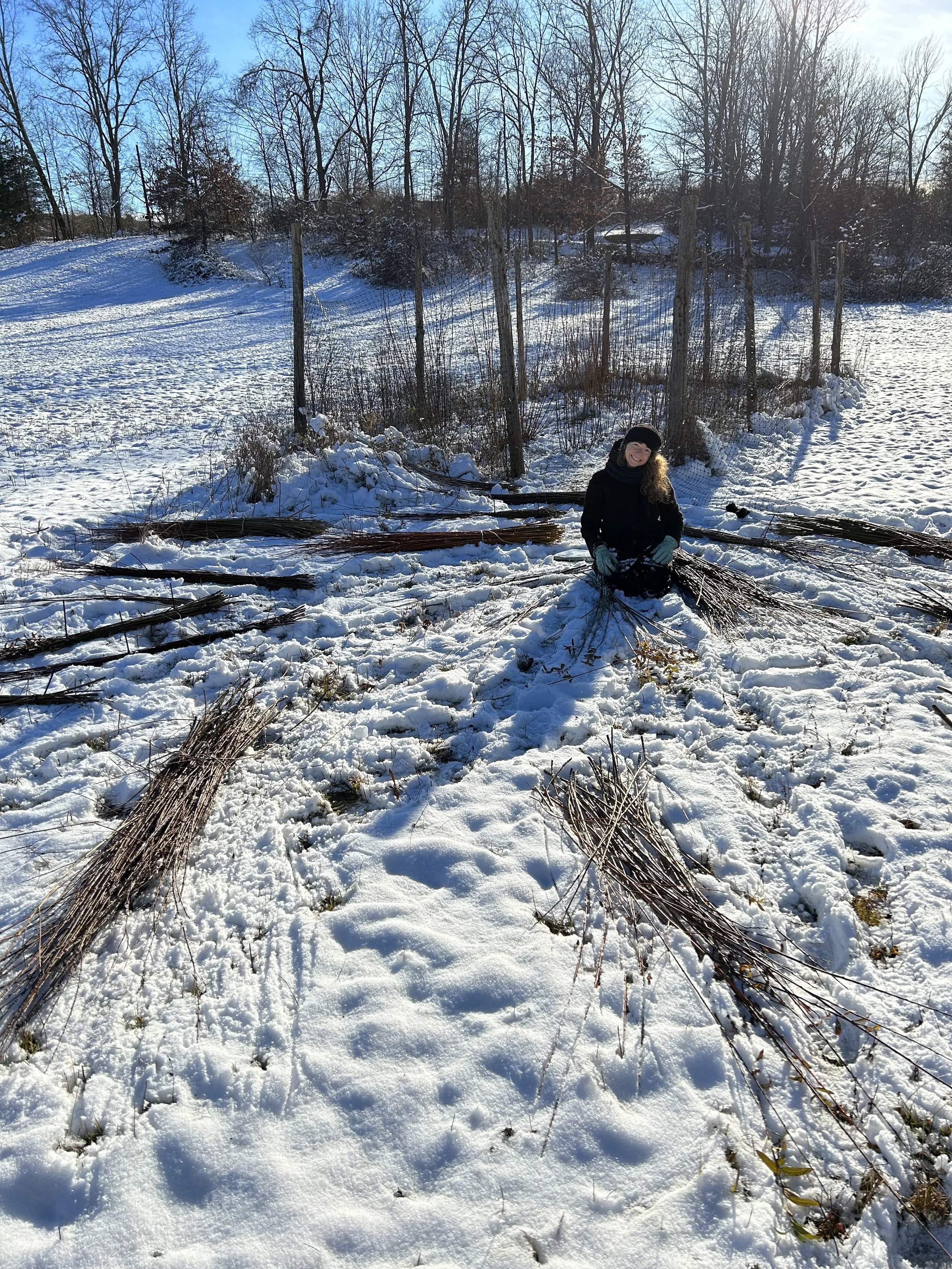About Elizabeth Gross
Weaving a casket, 2025
Welcome! I’m Elizabeth, and I’m a willow casket weaver and end-of-life doula crafting sustainable and biodegradable caskets, burial trays, and shrouds for New York’s Catskill Mountain and Hudson River Valley regions. I believe that death is a sacred process, and that natural burials can contribute to our lives and ecology by providing a bridge toward greater connection with the land and each other.
Conventional burials are by no means ecologically sound, with tons of materials buried each year that do not break down easily or provide benefit to the soil, plants, or the animals that live there. The Little Way Natural Caskets brings ecological care to the burial process during a time when the destruction of nature has become normalized within mainstream approaches to death and dying. I believe that natural death care can help us access greater comfort while navigating grief and loss by honoring the earth that is our home, from dust to dust.
Me with a willow harvest, 2022
My experience and background
As a death doula I work closely with individuals and families throughout the dying process, which shapes my work as a casket weaver. My hope is that those I serve with this work feel supported to cultivate their agency concerning burial care for themselves and their loved ones, and that death can be a healing process for all involved.
As of 2025, I am one of 9 formally trained casket weavers in the United States, all of which are women. The lineage that I am trained within, and plants that I’m working with, are unique in that they reflect the lives and landscapes that both the casket weaver, and who we are weaving our caskets for, inhabit and love. This process is made that much more possible when I have the opportunity to work with individuals, or their friends and family members when applicable, on more personalized casket designs.
My spirituality, rooted in the traditions of Christian mysticism and Buddhism, grounds me in the awareness that life is a mystery. I believe that part of what makes humans wonderful is our capacity to provide loving support to each other as we navigate our personal journeys towards greater love, acceptance, and peace with this mystery. Contemplative practices such as meditation and prayer are some of the main ways I find deeper meaning and trust in the process.
My spirituality lays the foundation for my casket weaving, which I experience as mediation in action. As I’m weaving each casket by hand, I weave in wherever possible plants of significance for whomever the casket is for while sending loving kindness to him or her, envisioning this person at peace throughout their death transition. The meditative nature of weaving, with its rhythmic techniques and focus on the present moment, can also be particularly beneficial for a person who wants to come and participate in the weaving of his or her own casket, or that of a loved one. Casket weaving creates fertile ground where humility, compassion, gratitude, reverence and devotion can all flourish throughout the crafting process.
I come from a long line of craftswoman who refined skills such as lacework, crochet, and mending as a way of life. Creating simple pieces of beauty by hand is a big part of how I connect with my ancestors, and celebrate their legacy with how I serve my community and live my life. I also have a background in medicinal herb garden design and management, wilderness education, herbalism, meditation and yoga instruction, and the holistic healing arts. I am passionate about working with my hands to create healing artworks, tending to the soil and plants, nature based spirituality, and being intimately connected with the growing seasons. Deepening those skillsets, practices and ways of life in service to my community is a huge reason why I am a casket weaver.
Fitting a casket lining, 2024
My philosophy
We all remember the littlest of moments surrounding the death of a loved one, as our senses are heightened during this tender time of our lives. It’s important to acknowledge the vulnerability that comes with death and to cradle it in a protective way, like you would cradle a newborn baby. Death requires patience, compassion, sincerity, sensitivity and earnestness. It’s a time when little signs of beauty and hope can go a long way.
Natural death care is a way to keep the dying process in the people’s hands, and to not give the care of our loved ones over to the “professionals” when it’s often not necessary to do so. Death care is something that we know how to do as humans. Oftentimes we just need a little education, encouragement and support to know our options, so we can make choices that honor the lives that we and our loved ones have lived through the intentional choices we make.
Our culture is largely overwhelming and overstimulating, and dealing with the logistics of burial care on top of the grief we experience can feel daunting. Keeping death care as simple, natural and local as possible minimizes external pressures, and allows our focus to be on our loved ones and our deeper spiritual work as we navigate grief and loss. The Little Way Natural Caskets is my effort to do my part in a cultural mending process where death is honored as a sacred time, and people have more ecologically conscious options to choose from for their death care.
About the natural materials I work with
As my work is devoted to ecological preservation, keeping my weaving practice anchored in the local landscape is important to me. This means that locally grown plants are embedded within the casket design, and fabrics are naturally dyed with bioregional herbs that have healing qualities, through the colors and energetics that exist as part of plant matter.
Caskets and burial trays are made with willow, pine, and hemp rope. The fabric I use for shrouds, casket linings, mattresses, pillow case covers and top sheets are made of cotton. The filling of mattresses and pillow cases are made of wool and dried herbs. I naturally dye the fabric that is used in both shrouds and casket fabric linings, when applicable to the casket design. My weaving style is simple, and allows the beauty of the natural materials I’m working with to come through. Each casket is unique, and it’s nuances are signs that a human being made it, rather than a machine. I favor natural, soft color choices that serve as a reminder of hope.
Havesting willow, 2023
My intentions with this work
Eventually I’d love to have a small willow and flower farm, along with a natural dye garden. It’s from there that I plan to harvest the natural materials used in the crafting of my caskets and shrouds, and flowers for home funeral and natural burial arrangements. My intention is also to have a designated workshop space where I can weave my caskets and host community members who would like to play a deeper role in the weaving and design of their casket. These goals are in largely service to furthering the sustainability and locality of my work.
My main wish is that people feel supported through very difficult times with beauty, and gentleness.
Certifications and Trainings
2024: Willow Casket Weaving Apprenticeship (Moss and Thistle Farm)
2024: The Social Art of Natural Death Care: Body Care (Sophia Center for Life Studies)
2023: Hospice Volunteer Training (Hudson Valley Hospice)
2021: End of Life Doula Certification (The Dying Year)
2020: Creating an Herbal Toolkit for End of Life Care (Emily Ruff)
2018: Inner Yoga Teacher Training Program (David H Wagner)
2018: Embodied Flow™ Yoga and Somatics Certification: 300HR (YT)
2017: Herbal Intensive Program (Dina Falconi)
2015: SomaVeda® Certified Advanced Thai Yoga Practitioner (CATP)
2012: Ashtanga Yoga 200HR (YT) (Michael Stein)
2011: Bachelor of Arts: Dual Major in Women’s Studies and Italian Cultural Studies (BA)
Ways to stay in touch
Follow me on Instagram @littlewaycaskets.
To learn more about my private practice in holistic healthcare, visit www.selkiemedicinals.com.
If you’d like to order a burial tray, casket or shroud, please email me with your inquiry at elizabeth@littlewaycaskets.com.



